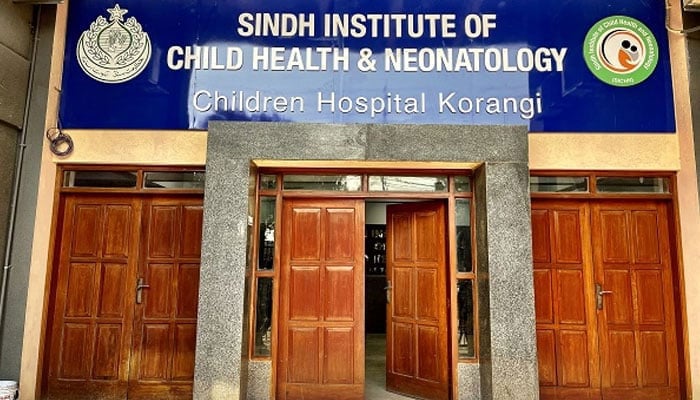SICHN achieves 90pc reduction in neonatal mortality
Paediatricians and technicians at the Sindh Institute of Child Health and Neonatology (SICHN) in Karachi have reported a significant breakthrough in reducing neonatal mortality by 90 percent.
This achievement was made possible through effective medical interventions at the Neonatal Intensive Care Unit (NICU) established at Jinnah Postgraduate Medical Center (JPMC). Highlighting the success, renowned pediatrician and Executive Director SICHN Prof Jamal Raza, emphasized the crucial role of timely and efficient resuscitation at birth. “Our team at the NICU, deployed from SICHN Karachi to JPMC, managed to reduce neonatal mortality by 90 percent over the past six months,” stated Prof Raza in an interview with The News.
Out of 10,776 births recorded at the JPMC between September 2023 and February 2024, only 43 infants did not survive. Prof. Raza hailed this accomplishment as a significant milestone, attributing it to small yet impactful medical interventions.
“Pakistan currently grapples with a neonatal mortality rate (NMR) of 42 deaths per 1000 live births, one of the highest globally. However, our trained staff at the NICU has remarkably lowered this rate to 4.2 per 1000 live births,” Prof Raza said.
Neonatal mortality in Pakistan is primarily attributed to preterm births, birth asphyxia, and neonatal infections such as sepsis, pneumonia, and meningitis. Prof Raza emphasized the critical need for prompt treatment of birth asphyxia, a condition resulting from lack of oxygen during birth.
He said some of the children born with serious health issues were even transferred to the SICHN main center in Korangi and treated there, adding that modern techniques including provision of High Flow Nasal Oxygen were being applied at the SICHN to treat children requiring artificial ventilation.
In addition to reducing neonatal mortality, the SICHN has treated 175,900 babies, including 3,500 neonates at their NICU. With an impressive survival rate of 86 percent, the facility, equipped with 52 intensive care unit beds, offers state-of-the-art ventilator support at no cost to patients.
Moreover, the SICHN has established Pakistan’s first Shariah-compliant Human Milk Bank in Karachi. Prof Raza highlighted the bank’s objective to provide pasteurized donor milk to infants unable to breastfeed, further enhancing their comprehensive neonatal care approach.
He underscored the importance of Shariah compliance in the milk bank’s operations, ensuring meticulous record-keeping and transparency. Furthermore, plans are underway to expand the SICHN’s services with the establishment of satellite centers, mirroring the success of the NICU in Sukkur.
“Sindh Health Minister Dr Azra Pechuho has commended the SICHN’s achievements and pledged government support to bolster quality healthcare services and reduce child and infant mortality rates across Pakistan,” he added.
-
 Why Prince William Releases Statement On Epstein Scandal Amid Most 'challenging' Diplomatic Trip?
Why Prince William Releases Statement On Epstein Scandal Amid Most 'challenging' Diplomatic Trip? -
 Historic Mental Health Facility Closes Its Doors
Historic Mental Health Facility Closes Its Doors -
 Top 5 Easy Hair Fall Remedies For The Winter
Top 5 Easy Hair Fall Remedies For The Winter -
 Japan Elections: Stock Surges Record High As PM Sanae Takaichi Secures Historic Victory
Japan Elections: Stock Surges Record High As PM Sanae Takaichi Secures Historic Victory -
 Prince William, Kate Middleton Finally Address Epstein Scandal For First Time: 'Deeply Concerned'
Prince William, Kate Middleton Finally Address Epstein Scandal For First Time: 'Deeply Concerned' -
 Kim Kardashian Promised THIS To Lewis Hamilton At The 2026 Super Bowl?
Kim Kardashian Promised THIS To Lewis Hamilton At The 2026 Super Bowl? -
 Andrew Mountbatten-Windsor Throws King Charles A Diplomatic Crisis
Andrew Mountbatten-Windsor Throws King Charles A Diplomatic Crisis -
 Barack Obama Hails Seahawks Super Bowl Win, Calls Defense ‘special’
Barack Obama Hails Seahawks Super Bowl Win, Calls Defense ‘special’ -
 Pregnant Women With Depression Likely To Have Kids With Autism
Pregnant Women With Depression Likely To Have Kids With Autism -
 $44B Sent By Mistake: South Korea Demands Tougher Crypto Regulations
$44B Sent By Mistake: South Korea Demands Tougher Crypto Regulations -
 Lady Gaga Makes Surprising Cameo During Bad Bunny's Super Bowl Performance
Lady Gaga Makes Surprising Cameo During Bad Bunny's Super Bowl Performance -
 Paul Brothers Clash Over Bad Bunny's Super Bowl Performance
Paul Brothers Clash Over Bad Bunny's Super Bowl Performance -
 South Korea: Two Killed As Military Helicopter Crashes During Training
South Korea: Two Killed As Military Helicopter Crashes During Training -
 Elon Musk Unveils SpaceX’s Moon-first Strategy With ‘self Growing Lunar City’
Elon Musk Unveils SpaceX’s Moon-first Strategy With ‘self Growing Lunar City’ -
 Donald Trump Slams Bad Bunny's Super Bowl Performance: 'Absolutely Terrible'
Donald Trump Slams Bad Bunny's Super Bowl Performance: 'Absolutely Terrible' -
 Jake Paul Criticizes Bad Bunny's Super Bowl LX Halftime Show: 'Fake American'
Jake Paul Criticizes Bad Bunny's Super Bowl LX Halftime Show: 'Fake American'




